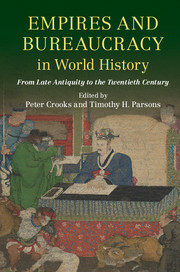Book contents
- Frontmatter
- Contents
- List of Figures
- List of Maps
- List of Tables
- List of Contributors
- Preface
- List of Abbreviations
- Part I Introduction
- Part II Empires and Bureaucracy in World-Historical Perspective
- Part III From Late Antiquity to the Middle Ages
- Part IV From the Age of European Expansion to the End of Empires
- Part V Afterword
- 18 Empires and Bureaucracy: Means of Appropriation and Media of Communication
- Index
18 - Empires and Bureaucracy: Means of Appropriation and Media of Communication
from Part V - Afterword
Published online by Cambridge University Press: 05 August 2016
- Frontmatter
- Contents
- List of Figures
- List of Maps
- List of Tables
- List of Contributors
- Preface
- List of Abbreviations
- Part I Introduction
- Part II Empires and Bureaucracy in World-Historical Perspective
- Part III From Late Antiquity to the Middle Ages
- Part IV From the Age of European Expansion to the End of Empires
- Part V Afterword
- 18 Empires and Bureaucracy: Means of Appropriation and Media of Communication
- Index
Summary
Weber's Ideal Types of Bureaucracy
The sociological writings of Max Weber (1864–1920) are an immediate starting point for analyzing bureaucracy. He offers two ideal types: his classic account of rationally organized bureaucracy of the modern state and modern organizations, and his far denser account of administration and officialdom in the premodern patrimonial state. In the index of these writings, ‘empire’ hardly appears at all, although the adjective ‘imperial’ crops up frequently, usually in descriptive passages exemplifying cases of bureaucracy and administration. This is somewhat surprising since Weber stands for wide-ranging comparative historical sociology and, in a work as comprehensive as his Economy and society, the reader might well expect to find a separate treatment of empire as a structure of power. In part, this absence of ‘empire’ may be explained by the fact that Economy and society remained unfinished at the time of Weber's death. He had hoped to complete a sociology of the state, so ‘empire’ might have appeared there, although recent scholarship suggests that it was the modern state in which he was interested. An early draft chapter on political communities has a section on the ‘Economic foundations of “imperialism” ’, but this provides only a starting point for further work. We have to conclude, therefore, that Weber did not treat ‘empire’ as a concept (G. Begriff).
‘Bureaucracy’, by contrast, is a concept for Weber – and within his methodology this matters. As noted in Chapter 1, Susan Reynolds urges historians to distinguish between words, concepts and phenomena. ‘Empire’ is a word with a bewildering number of usages. Placing ‘empire’ within a theory and providing it with a corresponding definition turns a word into a concept. In Weber's methodological writings, phenomena are considered infinite in terms of the dimension of time. For historians, especially of ancient empires and societies, evidence is all too scarce, but Weber's point remains valid in a logical sense: at any one point in history, an infinity of things were happening – being said, being done, being thought about it. The empirical world is dense with endless phenomena. The social scientist and historian are forced, maybe not always consciously, into being selective in what they choose to study and how they go about their investigation. The concept is the theoretical tool that represents those selection decisions.
- Type
- Chapter
- Information
- Empires and Bureaucracy in World HistoryFrom Late Antiquity to the Twentieth Century, pp. 437 - 456Publisher: Cambridge University PressPrint publication year: 2016
- 1
- Cited by



